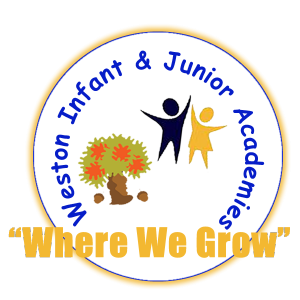Purpose of study – Taken from the National Curriculum
Mathematics is a creative and highly interconnected discipline that has been developed over centuries, providing the solution to some of history’s most intriguing problems. It is essential to everyday life, critical to science, technology and engineering, and necessary for financial literacy and most forms of employment. A high-quality mathematics education therefore provides a foundation for understanding the world, the ability to reason mathematically, an appreciation of the beauty and power of mathematics, and a sense of enjoyment and curiosity about the subject.
What your child will learn
We use the White Rose schemes of learning at the Weston Federation. These documents split the learning of maths over a year into units like “Geometry”, “Place Value” or “Measure”. Each of these units is then split into small steps. We use these to plan lessons for your child. In Key Stage 1 and 2 (Year 1-6) children have access to a red, blue and black tray each lesson. These are different challenges, all around the small step for that session. There is also a yellow tray, which is a problem-solving challenge that gives your child the chance to apply their learning from the session. In Foundation Stage (Nursery and Reception) children enjoy short maths sessions as a class, and then maths activities are available for the whole week in the classroom, or outside. These are based on the theme for the room, like dinosaurs or the seasons. The staff in the room use their expert knowledge to challenge and support your child at these activities to ensure that they get the most out of every session.
Follow the link to see the White Rose Schemes of Learning. (Use the dropdown box to change the year group scheme that you are looking at.) https://whiterosemaths.com/resources?year=year-1
Calculation Policy
Take a look at the document below to see how we support your child in making basic calculations, including addition, subtraction, division and multiplication.
Weston Federation – Calculation Policy (Draft)
National Curriculum Programme of Study
The document below (taken from the Department for Education) describes what your child should learn in maths over their primary education.
National Curriculum – Programmes of Study
NCETM progression maps
Click on the link below to see the NCETM (National Centre for the Excellence in Teaching of Mathematics) progression maps. These show you how your child will progress in one domain in maths. For example, they will show you how your child’s understanding of shape will progress throughout their education.
https://www.ncetm.org.uk/classroom-resources/progression-maps-for-key-stages-1-and-2/
Subject Aims
There are 3 aims from the National Curriculum relating to maths. They are as follows.
- become fluent in the fundamentals of mathematics, including through varied and frequent practice with increasingly complex problems over time, so that pupils develop conceptual understanding and the ability to recall and apply knowledge rapidly and accurately.
- reason mathematically by following a line of enquiry, conjecturing relationships and generalisations, and developing an argument, justification or proof using mathematical language
- can solve problems by applying their mathematics to a variety of routine and non-routine problems with increasing sophistication, including breaking down problems into a series of simpler steps and persevering in seeking solutions.
Click here to see the full document of subject aims – Subject aims for the whole curriculum
